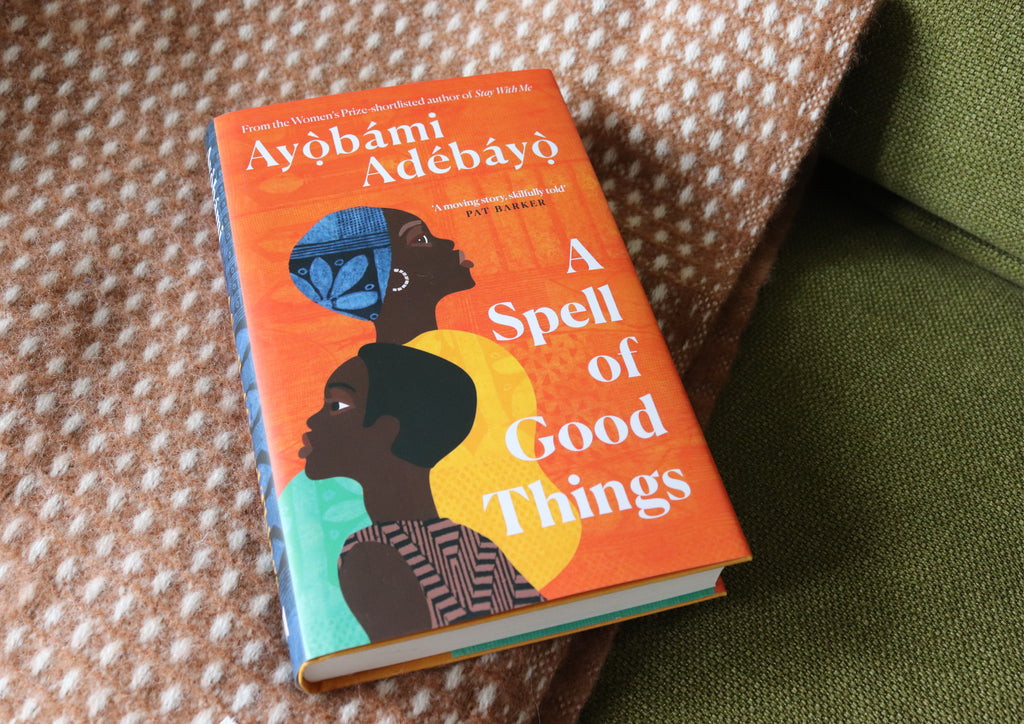
In 2017, the debut novel Stay With Me by Ayobami Adebayo was shortlisted for the Women’s Prize for Fiction. It was my favourite book from the prize list that year: the story of Yejide, a woman whose family persuaded her husband to take a second wife when she could not fall pregnant herself. It’s a tense family saga, steeped in Nigerian folklore. I adored it, and ever since then I have been eagerly anticipating her second novel. A few years back, at the Cheltenham Literary Festival, I asked her how this new book was progressing.
Jen: Can you tell us anything about what you're writing?
Ayobami: It's difficult for me to talk about it. Right up until Stay with Me was published, I had to really think about how to talk about it. People would ask me 'what is your book about?' and I would say 'it's about a man and a woman....'; that's all I could say, that's it. So, with this one I've been saying: 'it's about people.' So, that's where I am right now. It's a book about people.
Jen: As in, it's a book about community?
Ayobami: Yes! [laughs] Thank you, I’ll add that word to my book description, too.
Jen: [laughs] Do you have a deadline for it, or are you just seeing how it goes?
Ayobami: I'm seeing how it goes. I try to very deliberately not allow myself to be put under pressure. What I really want to create in terms of a creative space for myself is the place I was in before my first novel was published — which was where I didn't even know if anybody was going to read it, so I could do anything I wanted.

I very much admired the way she spoke about writing. Understandably, there’s a lot of pressure for writers to produce a second novel in record time, when their debut may have taken years to craft. “Second book syndrome” is a term that’s thrown around a lot, but there has been a six-year gap between Ayobami’s Stay With Me and her new novel A Spell of Good Things, published by Canongate this month. So: was it worth the wait?
Yes, I believe it was. A Spell of Good Things is very different to her first novel. It zooms out, as Ayobami hinted at in that interview. This is not the story of one couple; this is a book about people, about society. It is a story about the children of two families who are trying to escape the fate laid out for them by their parents’ actions. It’s about politics invading homes, the violence of wealth, the fragility of connection, and in places it plays with Dickens’s Great Expectations, too. I’d recommend it for fans of Chigozie Obioma’s The Fishermen.
Our two main characters are Eniola and Wuraola, two people who simply brush past each other on the page, their narratives seemingly separate, yet their actions have unknown consequences for each other further down the line. As with Stay With Me, Ayobami has taken great care with names, so if you read this book be sure to look up meanings as you go; there are many variations of names meaning “wealth” — sometimes this is sarcastic, sometimes not, but each character is seeking richness in one form or another. Eniola is trying to scrape together money for school fees, as his father has been out of work for a long time. Wuraola is a doctor; her family has plenty of money, yet they still want a powerful match for her when it comes to marriage.
In many ways, this story is a twisted, gender-flipped Cinderella tale. Outside of school, Eniola is learning how to make clothes. All the women he works with are invited to a party, as a thank you for creating the hosts’ outfits, but he is not. If he had attended, perhaps he would have met Wuraola and this meeting could have changed both of their stories, but this is not meant to be. This narrative switch is mirrored in a scene where Eniola’s sister misremembers the plot of Cinderella, mixing it up with the tale of the Three Wise Men. However, fairy tales are stories in constant evolution, and in this tale Eniola responds to a different kind of fairy godmother, one whose promise of gold requires him to do some not-nice things.
A Spell of Good Things is a novel that really crept up on me. It took a while to get settled, as there are so many different characters, but once I was in, I was hooked. Ayobami knows how to pull you into an emotional crescendo, and the ending of this book shook me. It takes the premise of a moral tale and asks what happens if several different moral tales are twisted together. How can characters escape from such a mess, and what will they do if they can’t? What protagonists have come before them? And what failed moral tales have already been buried deep in their family’s backyard?
Jen Campbell is a bestselling author and disability advocate. She has written twelve books for children and adults, the latest of which is Please Do Not Touch This Exhibit. She also writes for TOAST Book Club.
Add a comment